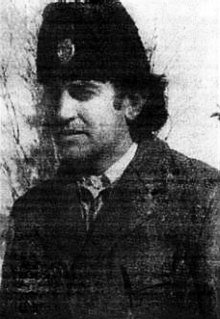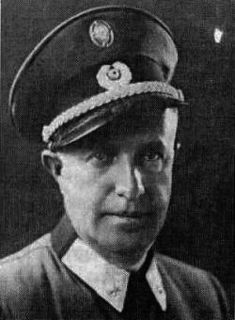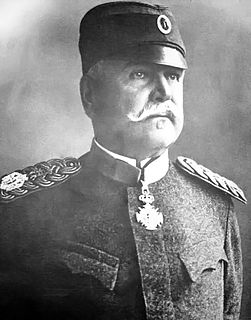 W
WBranimir Altgayer was a German minority leader in the Kingdom of Yugoslavia and the Independent State of Croatia, and an SS officer during World War II.
 W
WIvan Babić was a Croatian soldier and lieutenant-colonel in the Croatian Home Guard and later an emigrant dissident writer against Communist Yugoslavia.
 W
WPetar Baćović was a Bosnian Serb reserve army officer, lawyer, and then a Chetnik commander within occupied Yugoslavia during World War II. From the summer of 1941 until April 1942, he headed the cabinet of the Ministry of Internal Affairs for Milan Nedić's puppet Government of National Salvation in Belgrade. In July 1942, Baćović was appointed by the Chetnik leader Draža Mihailović and his Supreme Command as the commander of the "Chetnik Operational Units in eastern Bosnia and Herzegovina" during which he collaborated with the Italians and Germans in actions against the Yugoslav Partisans.
 W
WJovo Bećir was a Montenegrin Serb brigadier general and a colonel of the Royal Yugoslav Army.
 W
WBranko Bogunović, nickname Brane, (1911—1945) was one of the commanders of Serb rebels during the Drvar uprising who later became military officer of the Yugoslav Army in the Fatherland.
 W
WJezdimir Dangić was a Yugoslav and Bosnian Serb Chetnik commander during World War II. He was born in the town of Bratunac in the Austro-Hungarian occupied Bosnia Vilayet of the Ottoman Empire. Imprisoned during World War I for his membership of the revolutionary movement Young Bosnia, he subsequently completed a law degree and became an officer in the gendarmerie of the Kingdom of Serbs, Croats and Slovenes at the beginning of 1928. In 1929, the country changed its name to the Kingdom of Yugoslavia. In 1940 Dangić was appointed to lead the court gendarmerie detachment stationed at the royal palace in the capital, Belgrade. During the Axis invasion of Yugoslavia in 1941, Dangić commanded the gendarmerie unit that escorted King Peter II to Montenegro as he fled the country. In August of that year, the leader of the Chetnik movement, Colonel Draža Mihailović, appointed Dangić as the commander of the Chetnik forces in eastern Bosnia. Here, Dangić and his men launched several attacks against the forces of the Independent State of Croatia. Soon after his appointment, Dangić's Chetniks captured the town of Srebrenica. Afterwards, they became largely inactive in fighting the Germans, choosing instead to avoid confrontation. In December, Chetniks under Dangić's command massacred hundreds of Bosnian Muslims in the town of Goražde. In the same month, his Chetniks captured five nuns and took them with them through Romanija to Goražde, where they later committed suicide to avoid being raped.
 W
WCvitan Galić was a Croatian World War II fighter ace.
 W
WMuhamed Hadžiefendić was a Bosnian Muslim officer in the Home Guard of the Independent State of Croatia during World War II, commanding the Hadžiefendić Legion.
 W
WVučko Ignjatović was a Serbian officer of the Royal Yugoslav Army who was commander of the Požega Chetnik detachment during the Second World War in Yugoslavia.
 W
WJohann Iskrić was a Croatian Serb army officer in the Austro-Hungarian Army, and later in the Yugoslav Army and Croatian army, who fought in the Battles of the Isonzo. He was a recipient of the Knight's Cross of the Military Order of Maria Theresa.
 W
WSlavko Kvaternik was an Croatian Ustaše military general and politician who was one of the founders of the Ustaša movement. Kvaternik was military commander and Minister of Domobranstvo. On 10 April 1941 he declared the creation of the Independent State of Croatia.
 W
WMihajlo Lukić was a Croatian general who began his career as an officer in the Austro-Hungarian Army during World War I, then climbed the hierarchy of the Royal Yugoslav Army, finally joining the Croatian Home Guard during World War II. He was retired in 1943 due to his disapproval of sending Croat volunteers to the Wehrmacht. After the collapse of the Independent State of Croatia, communist authorities sentenced him to 10 years in prison.
 W
WMarko Mesić was a decorated gunnery officer who served in the armies of the Kingdom of Yugoslavia, the Independent State of Croatia, and the SFR Yugoslavia. He is best known for being the final commander of Croatian legionnaires in World War II, serving in the German Wehrmacht on the Eastern Front and in the Battle of Stalingrad.
 W
WKonstantin "Kosta" Mušicki commanded the collaborationist Serbian Volunteer Corps during World War II. He was captured by the British Army at the end of the war, but was subsequently handed over to the Yugoslav authorities, who tried and executed him for war crimes.
 W
WMilutin Đ. Nedić was a Yugoslav Armijski đeneral and Chief of the General Staff of the Royal Yugoslav Army prior to the outbreak of World War II. He was replaced in late 1938, and later commanded the 2nd Army Group during the German-led Axis invasion of Yugoslavia of April 1941. Nedić's command consisted of General Milan Rađenković's 1st Army, responsible for the area between the Danube and the Tisza, and the 2nd Army of General Dragoslav Miljković, responsible for the border from Slatina to the Danube. Nedić had no Army Group reserve, but the 2nd Army was to constitute a reserve of one infantry division deployed south of Slavonski Brod.
 W
WMane Rokvić was a Serbian guerrilla commander during the Second World War. Rokvić briefly commanded of the Yugoslav Partisan 4th detachment of the Sloboda Battalion during the 1941 Drvar uprising, a spontaneous resistance by the Serbian population to the genocidal activities of the Independent State of Croatia in Western Bosnia. Later and most notably, Rokvić left the communist cause to join the royalist Dinara Chetnik Division to command of the King Alexander I regiment.
 W
WTomislav Sertić was a member of the Croatian World War II Ustaše regime in charge of the Independent State of Croatia during World War II.
 W
WFranjo Šimić was a Croatian colonel, and later general, in the Croatian Home Guard. Prior to World War II he served as Maria of Yugoslavia's adjutant.
 W
WColonel Dr. Roman Sondermajer CMG was a Royal Serbian Army physician who served as Chief Surgeon of the Royal Serbian Army, Chief Surgeon and Director of the Military Hospital and Chief of the Medical Staff of the Serbian Supreme Command during World War I.
 W
WDanilo "Dane" Stanisavljević was one the leaders of the uprising of Serbs in Lika against the Independent State of Croatia and later a military officer of the Yugoslav Army in the Fatherland with the rank of voivode.
 W
WField Marshal Stepan "Stepa" Stepanović was a Serbian military commander who fought in the Serbo-Turkish War, the Serbo-Bulgarian War, the First Balkan War, the Second Balkan War and World War I. Having joined the Serbian military in 1874, he fought against the forces of the Ottoman Empire in 1876. Over the following years, he climbed up the ranks of the Serbian Army and fought against Bulgarian forces in 1885. He eventually became the Serbian Minister of War in April 1908 and was responsible for instituting changes in the Serbian Army.